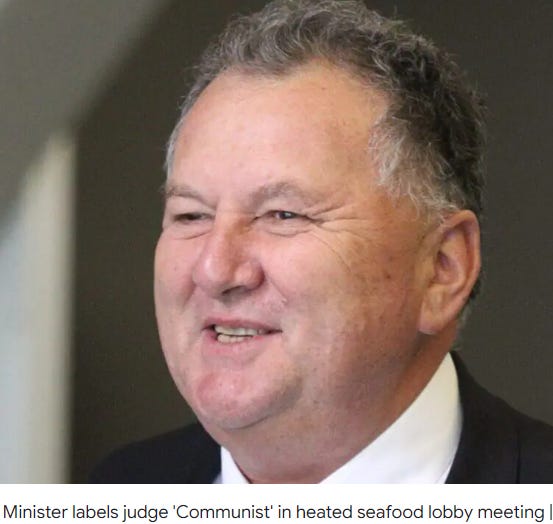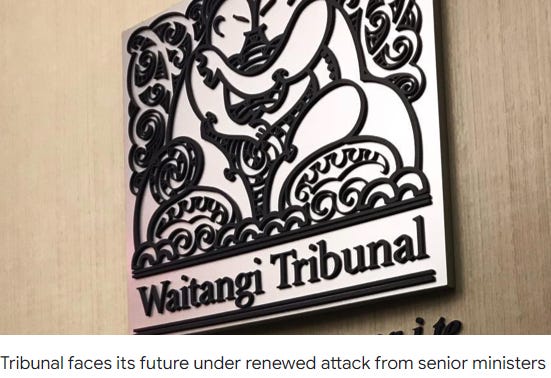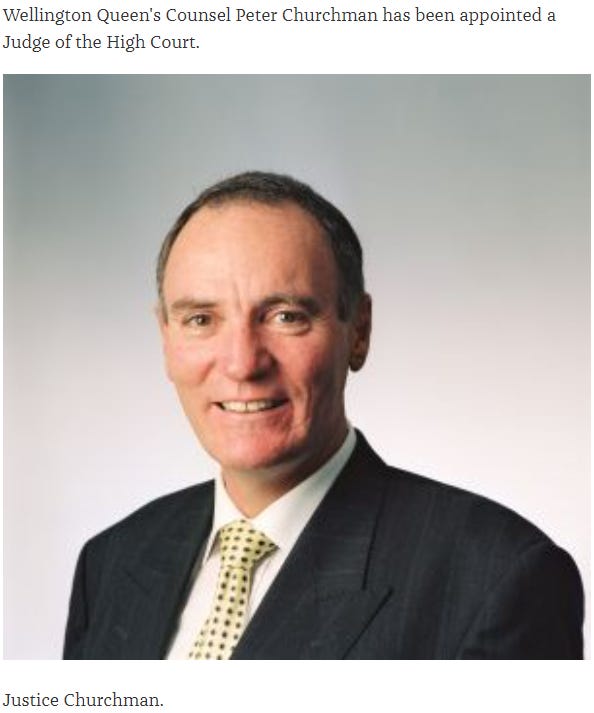UNCIVIL WAR
Unholy constitutional conflagration rages on in Aotearoa New Zealand
The conflict is hot and will only get hotter. Figurative flames, ballistics and scalding hot air are blasting from multiple flues, in every direction. In all the hullabaloo, woo-woo, boo-hoo and utu, few have a clue about this attempted coup. Do you?
Enough Seuss. Let’s juice up on New Zealand’s basic constitutional structure.
Constitutional Arms of Aotearoa
There are three basic branches of government in New Zealand:
Parliament, comprising our democratically elected representatives. This “legislature” passes laws and supplies the executive branch (Government) with Ministers from the ranks of the Members of Parliament.
The Government, which runs the country and can propose laws for Parliament to pass (or not). The Government includes the public service, who are our unelected governmental bureaucrats. (The traditional notion of public “service” is a terrible casualty in this war.)
The Judiciary (judges) who, in cases that come before the Courts, are supposed to apply and interpret the law – both the laws passed by Parliament and the so-called “common law” (legal rules that Parliament has not generated). Parliament can override the common law, with legislation. Judges are not elected. They get appointed through arcane processes involving dinner parties, sycophancy, ideological favoritism – and, just occasionally, merit.
But wait, there’s more - an informal 4th arm of Government - the media, the “press”, the Fourth Estate – call them what you will. Those who report “news” and can advocate and frame political issues. The media’s news is supposed to be factual and impartial. Advocacy, media opinion pieces and framing of political issues – they’re different stories.
But wait, there’s even more. The steak knives. The Waitangi Tribunal wields the knives, trying its best to stab the Government and slash the country to shreds. If the Tribunal stuck to its knitting, it would be a humble public service entity making occasional measured recommendations to the Government on Matters Māori. But the Tribunal has self-identified as a Three Headed Māori Monster; a Māori Parliament, Government and Court, all rolled into a renegade cohort of treacherous and subversive activists.
The latest battle
The most recent skirmish in this so-far bloodless civil war involves the irrepressible Government Minister, Shane “Matua” Jones.
It was revealed in Parliament on 27 August 2024 that, at a seafood industry hui in May 2024, Fisheries Minister Jones idly opined that High Court Judge Cheryl Gwyn is a “Communist Judge”.
Jones’ comment on Gwyn would have been lost in the mists of time, but in schoolgirlish fashion an officer of Māori Crown Relations - Te Arawhiti recorded the comment and snitched on Jones.
Jones defended himself in Parliament on the basis that Gwyn used to belong to the Socialist Action League (perhaps still does, who knows). From 2014-2020, Gwyn was the Inspector-General of New Zealand’s Security and Intelligence Service. Yes, you read that right.
Parliament Speaker Gerry Brownlee supported Jones, finding that Jones’ defence was “pretty reasonable”. ACT Leader David Seymour chimed in for Jones, expressing his surprise “that the leader of the Labour Party [Hipkins] believes ‘communist’ is a critical term”.
The matter would’ve died in Parliament but on 28 August Maria Dew, as President of the New Zealand Legal Bar Association, went into bat for the Judiciary, and against Jones and the Government, announcing:
“It is fundamental for our democracy that judges are not the subject of personal attack or criticism by ministers that may risk judges being restricted in their role.”
"Judges must be capable of being able to freely play their independent constitutional role in Aotearoa New Zealand."
This Dew, far from evaporating, has whinged to Attorney-General Judith Collins that Jones had breached the requirement of the Cabinet Manual (the code of conduct for Government Ministers) that “Ministers should not express any views that are likely to be publicized if they could be regarded as reflecting adversely on the impartiality, personal views, or ability of any judge”.
Collins promised Dew that she’d have a word with Jones. And Jones has had further words of his own, opining that Court decisions are “beginning to show elements of totalitarianism”, adding:
“What I mean is that we're going to change the law that pertains to the takutai moana [Marine and Coastal Areas] because that law has given a status to the Treaty that overwhelms our democratic right to not only redefine takutai moana but it restores back to the sovereignty of Parliament from the judiciary the meaning of the legislation. That's democracy."
Battle lines drawn
This evolving and escalating war is fundamentally over the preservation of New Zealand Democracy and Parliamentary Supremacy. In one corner, we have the current Coalition Government, which likes to think it retains the traditional power to make binding and enforceable laws by majority vote in the democratically-elected Parliament.
The revolting opposition corner is cluttered with the following forms of protagonist:
The Judiciary, which now thinks it can and should ignore and override laws passed by Parliament that don’t align with its ideological biases
Opposition political parties Labour, Greens and Te Pati Maori, who maintain that a mystical unity called “Maori” never ceded sovereignty of New Zealand and therefore retains constitutional powers which, through the Waitangi Tribunal and otherwise, override Parliament.
Mainstream Media, which doesn’t really understand what’s going on but sides with the current political opposition and thinks that those on the opposite side in this civil war are all just Racist, Transphobic Troglodytes.
The Waitangi Tribunal, which wants to burn the house down.
Origins of this battle
The genesis of this current bruhaha lies in a 2021 decision of Court of Appeal Aotearoa in Re Edwards. Let’s extract the barren marrow of that decision (the decision is a tome of 215 pages) …
The Marine and Coastal Area (Takutai Moana) Act 2011 entitles people with Maori ancestry to “customary marine title” (basically, ownership of) marine and coastal areas. Multitudes of Maori groups have claimed practically all of Aotearoa’s coastline under that Act.
Under the Act, an applicant group has customary marine title to an area if the group:
Holds the area in accordance with tikanga (for uninitiated, that’s Maori customary practices)
Has exclusively used and occupied the area from 1840 until the present day without substantial interruption, or has received it from another Maori group in accordance with tikanga
The judge in the Re Edwards case was a chap called Peter Churchman.
Churchman didn’t like the legislative requirement – in order for a Maori group to be able to get customary marine title to an area – that the area must have been exclusively used and occupied from 1840 until the present day without substantial interruption and in accordance with tikanga. Church’s felt that requirement is soooo unfair. So, Peter simply ignored the statutory wording and significantly watered down the prerequisites for customary marine title. I’ve covered this sort of brazen judicial activism in previous Substacks:
Judge Gwyn, worshipping the Churchman revisionist approach to customary marine title, has in 2024 granted such titles, on the Wairarapa coastline, to five Maori groups.
Churchman and Gwyn have been quite willing to ignore Parliament, but our current Government is not willing to ignore Churchman and Glynn. Our Government is therefore going to pass further legislation to correct Churchman’s revisionist judicial reinterpretation of the requirements for coastal marine titles, as expressly set out in the Marine and Coastal Area (Takutai Moana) Act 2011.
The Law Society has predictably gone full noise against the Government’s corrective legislation, making a submission to Māori Crown Relations - Te Arawhiti (the same ones who snitched on Jones) railing against the legislation on the basis that it…. surprise, surprise, drum roll…breaches the Principles of the Treaty of Waitangi.
Judicial overreach and childishness
In New Zealand’s activist Judiciary, we therefore have a cry bully Woke outfit that can give it but can’t take it. We have judges and a legal profession elite who delight in encroaching on Parliamentary sovereignty, usurping and undermining Parliament, and then have infantile hissy fits when the Government punches back and rightly puts them back in their appropriate box.
Who would you prefer to run the country – a Government composed of people elected to our Parliament, who can be booted out, or an unelected and unaccountable elite of activist judges and Waitangi Tribunal wreckers?







Thanks Halfling. This is exactly the sort of exchange we're aspiring to broadcast, eh? 'll come back to you more fully. I read your erudite post before I posted mine...but jumped anyway!
John
I have covered an aspect of this issue in "Mere Rhetoric, Descriptive or Something Else" - see https://djhdcj.substack.com/p/mere-rhetoric-descriptive-or-something
I can go some of the way with you but I think your critique of Churchman J and Gwyn J are more ad hominem (and feminam). Better to have pointed out why they are wrong and why it is that Gwyn J was bound to follow the Court of Appeal.
Ultimately the resolution of the matter is with Parliament as it was with the Foreshore and Seabed Act - remember that was as a result of judicial interpretation as well.
A couple of other things.
Lest it be thought that you might advocate for an elected judiciary who can be turfed out every so often, remember that a lot of blood has been spilt over the establishment of judicial independence. Security of tenure means that Judges do not have to worry about whether the decision is popular or unpopular as long as it is according to law.
To my second point - what we are really talking about here is a law which begs different interpretations. That is not good law because it is uncertain. That should be the focus of attention rather than in personam attacks on the Judiciary.
I might say that on a number of occasions in my judicial career I made decisions according to law and pursuant to my judicial oath. Some of those decision attracted quite a bit of adverse comment (even from a Minister of the Crown). Was I intimidated by that - not at all, nor did it cause me to question my decision or recall ther judgement. If I was in error I would be corrected on appeal. In a couple of cases I was, and that was fine - because that was the way that the law works.